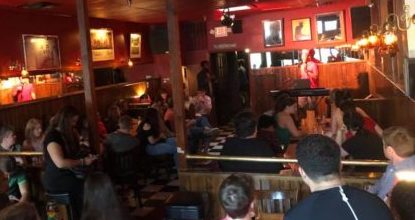
Iowa’s spoken word community is a snowball rolling down a hill, picking up participants and supporters at a self-propelling pace.
From major poetry slams in Des Moines, Iowa City, Quad Cities, Cedar Rapids, and Ames, to other spoken word showcases popping up throughout the state, poetry’s presence is becoming impossible to ignore.
You may find yourself interested in joining this movement but feel bogged down by questions like, “What do I expect from a spoken word event? Am I the right type of person to show up? Am I even invited?”
As an active spoken word performer for 8 years, I’ve attended, participated in, and produced multiple spoken word events. I can assure you, not all events are the same. But you can expect some common characteristics.
Whether you find yourself in a bookstore, coffee shop, restaurant, or theatre, almost all spoken word spaces are set up for comfort. The atmosphere, often dim lights and soft jazz in the background, is intentional in reminding you that spoken word events are laid back, welcoming spaces.
If you arrive early, which I suggest you do, you may be able to meet the performers. This could be the best way—though possibly the most intimidating—to relieve your nerves.
I have never met a performer who is not utterly humbled by the fact that someone came to hear what they had to say. You’ll be greeted with giant grins, hands to shake, and even hugs if you’re comfortable. Spoken word performers get on stage hoping you’re there to listen. When you are, they feel complete.
“I often opt out of using words completely, to try and stay out of the way of the poet. You may hear me let out a grunt that is more brute than beautiful.”
— Caleb Rainey
You may ask yourself, “What if I’m not the right type of person?” I must tell you, being “the right type of person” is simple: be ready to listen. In the dozens of events I’ve been a part of, one of the most fascinating aspects is that not a single person in the crowd seems identical to their neighbor. In short, it’s a diverse group.
For example, when I attended the Iowa City Poetry Slam in 2018 as an audience member, I saw groups of competitors that truly reflected the audience’s full spectrum of people.
A gay, white man talked about the battle of oppression and privilege within his own identities. An elderly Black woman shared her life experiences in the south. A non-binary person shed light on society’s issues with pronouns. A young white woman tackled the truth behind her own trauma. ABlack man battled with the meaning of beauty, and so on and so on.
If you have a story to share, take the stage; if you have an open heart, come and listen. It truly is that simple. We are all welcome.
When you find yourself in the crowd, there are a few tricks of “active listening” to make sure you’re the best audience member you can be.
People will be taking the stage to share their stories, and we all work together to make the space safe. Active listening is central.
The fun behind active listening is that you can make it your own. For me, since I’m a naturally loud person, I employ several common active listening techniques, often all at once. It’s all about what you’re comfortable with:.
First, let’s talk about the classic finger snapping. You do this when the performer says something that resonates with you, or when the word play is fun. If a table or counter is near, substitute snaps with light knocking. The soft sound of snaps or knocks signals to the performer they are connecting with you—their primary goal.
Second, let’s talk about audible sounds. This is not a technique to be stingy with. When a line strikes the biggest heartstring you have, and a chord of beauty and pain comes out, that’s when you meet the poet where they’re at and employ this, my favorite technique
Audible sounds have a wide range. They should never over shadow the poet who’s performing,
The key is to be short and sweet. What you actually say is less important.
I often opt out of using words completely, to try and stay out of the way of the poet. You may hear me let out a grunt that is more brute than beautiful. Others often express their excitement with short words like, “yeah,” “wow,” “oh,” “tell-it,” “come-on,” “alright,” etc.
Now, you’re ready. The events are coming up left and right, and they are near you. Spoken word is a welcoming universe essential for the development of art, healing, and good-personhood. The spoken word community is growing, and it’s inviting you to join. All are welcome.
If you’re a performer, brave the stage! We need your story. If you’re a supporter, bring your heart. We need your compassion.


